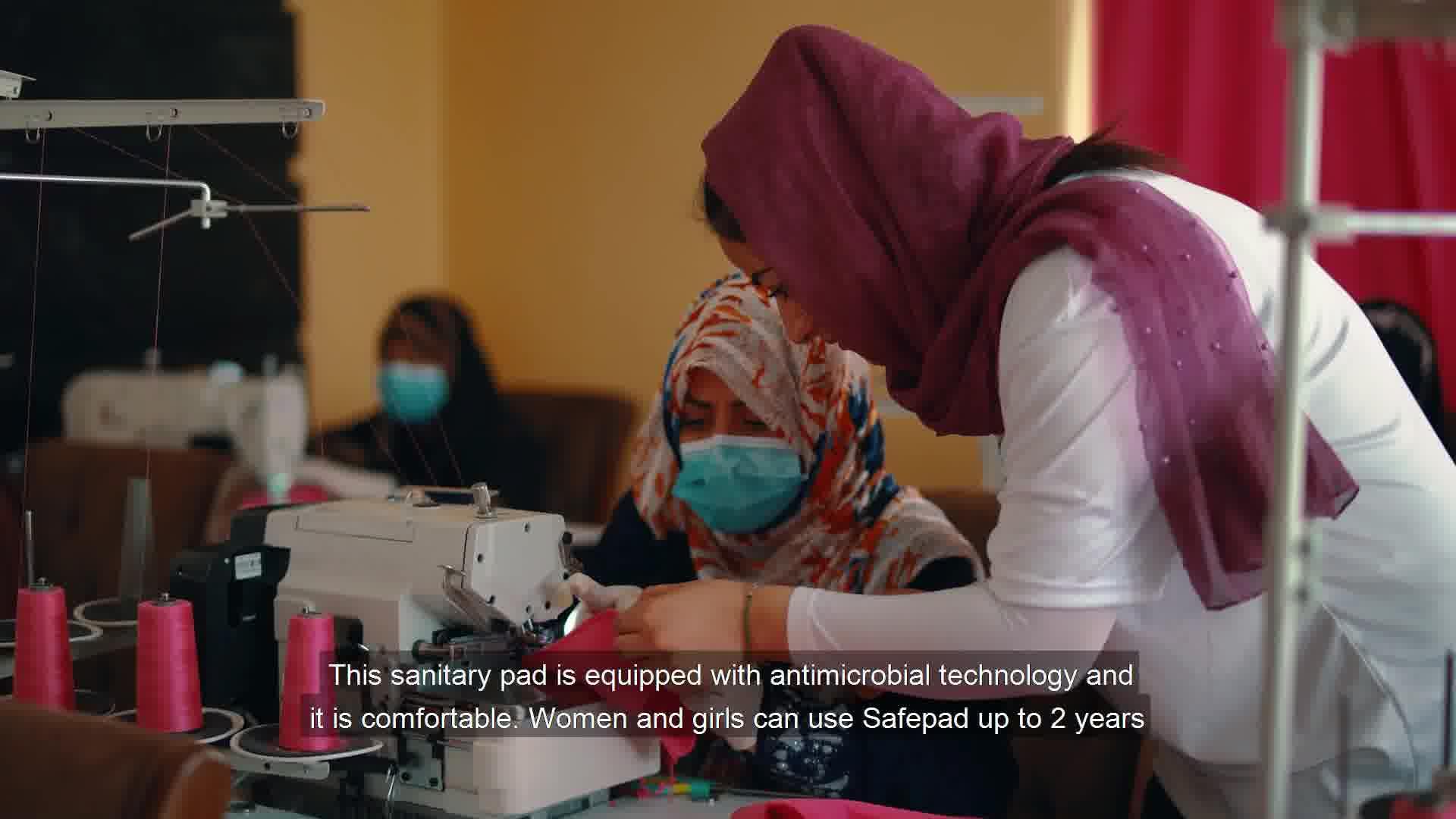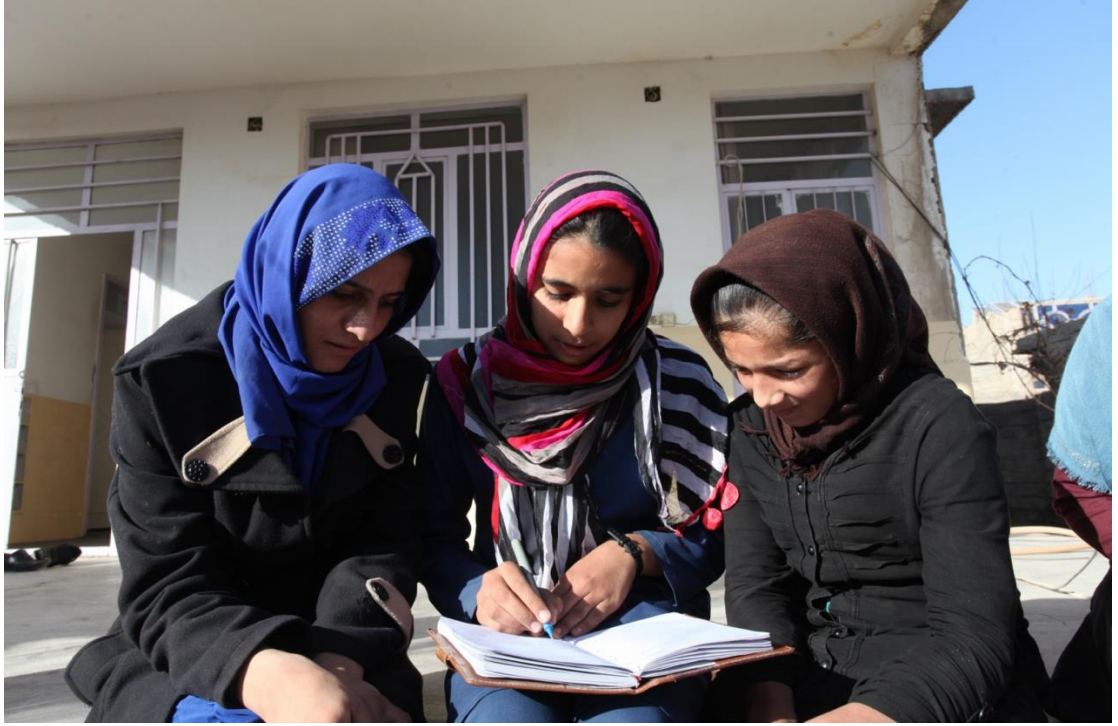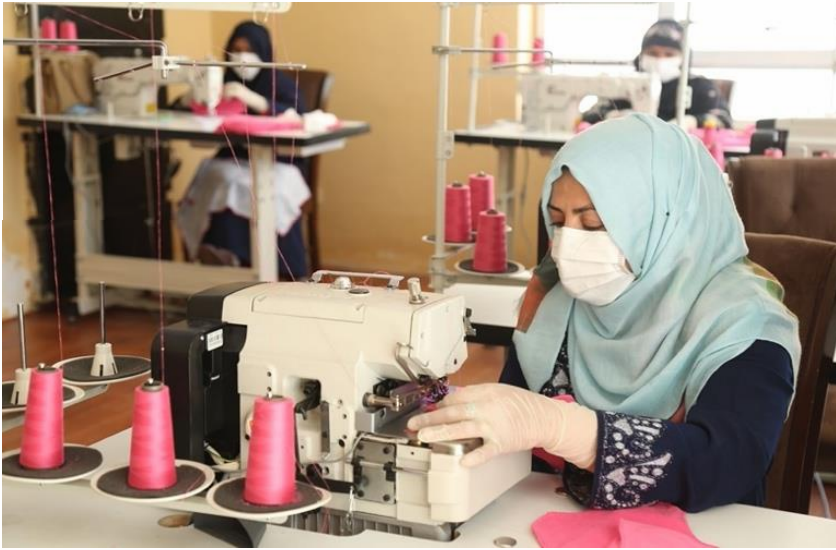SafepadTM reusable sanitary pads empowering woman in Afghanistan
Kolding, Denmark, 14th May 2021
Now, reusable sanitary pads, Safepad, are produced in Afghanistan. Safepad is the first sustainable solution for women’s menstrual hygiene management that safeguards Afghan girls and women’s active participation in public life.
In February 2021, a Safepad production center was established in Kabul in collaboration with one of the innovators of Safepad, Trine Angeline Sig, who is the Managing Director of Real Relief. Safepad is the highly effective, reusable sanitary pad, that contains a permanent self-sanitizing antimicrobial treatment, effectively reducing fungi and bacteria during use and after washing, even if contaminated water is used. It has a lifetime of at least 2 years and contributes considerably to reduce menstrual waste and thereby has an environmental impact.
In Afghanistan, period poverty is a public health crisis that is primarily driven by stigma and low socioeconomic status. The taboo surrounding the female body prevents any conversation about menstruation, which reinforces gender inequalities. This can be quite detrimental to the self-confidence and social status of a girl who should not be negatively impacted by a completely normal and biological process that happens in her body.
Our girls face challenges and barriers every day that limits their access to educational, health, employment, and development opportunities. One of these challenges is the lack of access to information and adequate resources on menstrual health and hygiene management. Families and schools do not educate girls on menstruation health and hygiene which combined with poor sanitary conditions have a negative impact on girl’s schooling and their overall wellbeing. Consequently, it leads to reduced school participation, increased rate of school dropouts, increased risk of preventable diseases, and anxiety and misconceptions regarding fertility.

Access to menstrual related information and products is a basic human right and feeling clean, confident, and capable during one’s period is a necessity for all women. Setting up a sustainable supply chain, making quality menstrual hygiene products and proper educational information available is key. In this context, huge strides have already been made by the Afghan Government, UNICEF, and civil society activists.
In 2018, The First Lady Rula Ghani Bibi Gul laid the groundwork, as a patron of girl’s education and empowerment, in partnership with UNICEF and the Ministry of Education. On an occasion during International Girls Hygiene day, she stated that “With good hygiene, they can have better control over their bodies, increase their self-confidence, and improve their attendance in school. Most importantly, healthy girls of today are the future mothers who will safeguard the process of motherhood and decrease mortality rate amongst young mothers.”
UNICEF launched in 2018 the first ever Menstrual hygiene Management (MHM) guideline in Afghanistan, that is complemented by a comic and simplified materials. The main aim of the guideline is to break taboos and raise awareness about the importance of good menstrual hygiene management for adolescent girls and women in Afghanistan. Furthermore, in cooperation with the ministry of education, in 2019, UNICEF successfully distributed 100.000 copies of MHM booklets amongst adolescent girls in schools. Teachers have been trained in the MHM guidelines, so that they can mentor while encouraging healthy and safe personal hygiene practices among schoolgirls.
However, even with such efforts, key findings from UNICEF indicate that in Afghanistan MHM still has numerous challenges, seeing that:
- 50% of girls are unaware of menstruation until they have their first period.
- 29% of girls miss school days while menstruating and 62% of them were found to manage their periods using an old piece of cloth.
- 70% of girls do not bathe during their period for fear of infertility and due to prevailing misconceptions and wrong practices.
- 80% of girls are not allowed to attend social events while menstruating.
Given the multiple challenges women and adolescent girls face, it is evident that promoting MHM is not only a sanitation matter, but also an important step towards safeguarding the dignity, bodily integrity, and overall life opportunities of women and girls. For the woman and girls to achieve a better future and avoid barriers to education, empowerment, and dignity, menstrual health must be prioritized. With better access to information and the ability to safely manage their monthly menstrual cycle with privacy and dignity women and girls can have full access to education, employment, and other opportunities and become productive members of society

The Safepad sanitary pad production in Kabul aims to strengthen the livelihood of Afghan women and schoolgirls, so that they are better equipped to claim their civil, economic, and social rights. In addition to its health and sanitation benefits, Safepad is a good opportunity to empower women and help them become economically self-sufficient and less dependent on humanitarian assistance.
After having received the necessary professional training, Afghan women have been employed in sewing, finishing, and packaging Safepad. This will empower them to generate a reliable income, help build local capacity, contribute to creating sustainable business within their community.
The Safepad team in Afghanistan, in collaboration with Real Relief, Global Goals World Cup, UNYA Denmark, and partners in 26 countries across the globe, participate in a transnational dialogue on menstrual health to mark the International Menstrual Hygiene Day on the 28th May, 2021. We have mobilized influencers from the government, civil society, and youth to highlight challenges and barriers surrounding MHM and to promote the normalization of menstrual health and hygiene management through the use of a social media campaign. We encourage you to download and watch the below videos:

Feel Safe – Feel Empowered!
As the Safepad™ project scales up, the successes will enhance other livelihoods through marketing and commercialization, to alleviate poverty through sustainable production and job creation. Safepad, an innovative reusable sanitary pad, is a safe path to a promising future for Afghan women and other women around the globe.
More information about Safepad is available at www.realreliefway.com or by contacting:
Real Relief’s Managing Director, Trine Angeline Sig at ts@realreliefway.com, mobile: +45 2826 2600 and/or by contacting the Safepad team in Afghanistan, at osmaniarezo@gmail.com, phone: +93 (0) 79 032 4281/ +93 (0) 79 806 0198
Connect with Safepad in Afghanistan
www.facebook.com/safepadafghanistan
Connect with Real Relief
www.facebook.com/realreliefway
www.linkedin.com/company/real-relief
www.youtube.com/c/realreliefway
www.instagram.com/realreliefway
